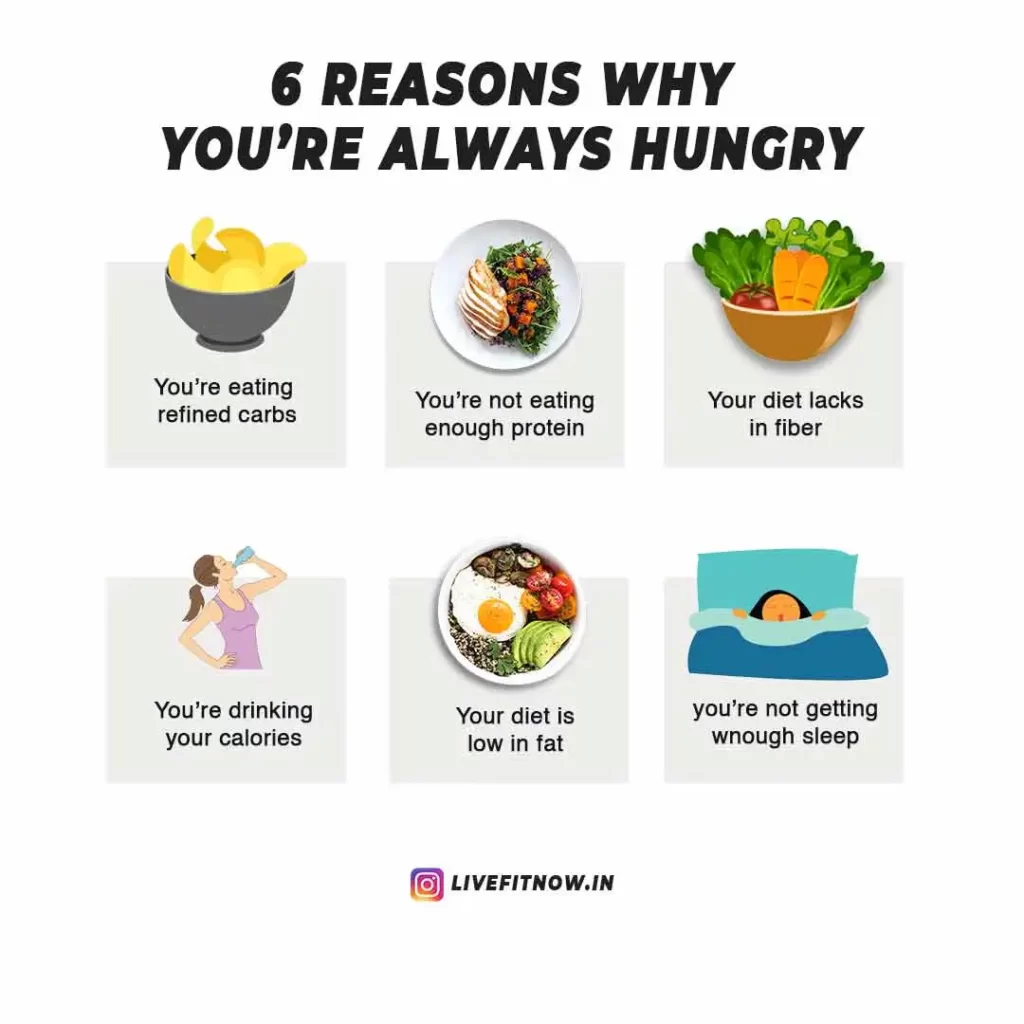Hunger is your body’s signal that it needs more food.
Most people can go several hours before feeling hungry again, but this isn’t the case with everyone.
There are several possible reasons for hunger pangs, including a less nutritious diet, stress, less sleep, and dehydration.
This article discusses 6 reasons why you’re always hungry.

1. You’re not eating enough protein
Consuming enough protein is essential for a healthy diet plan.
A high protein intake boosts metabolism, reduces appetite, burns fat, and changes several regulating hormones.
Protein has hunger-reducing properties. When you eat protein your body increases the production of a hormone that triggers the fullness signal and reduces the level of hormones that stimulate hunger. ( 1, 2 )
This effect is one of the reasons you’re always hungry if not eating enough protein.
A study found that 14 men with excess weight who consumed 25% of their calories from protein experienced a 50% reduction in late-night snacking, compared to the group that eat less protein
By eating protein in every meal, you reduce the hunger hormone and boost hormones that keep you full. This leads to a major reduction in hunger and is the main reason behind weight loss. Because it helps you eat fewer calories automatically.
2. You’re eating refined carbs
Refined carbs are highly processed and lack fiber, essential vitamins, and minerals.
White flour, bread, pasta, and foods like soda, and candy which is made with processed sugars are some of the most popular examples of refined carbs.
Your body digest refined carbs very quickly due to the lack of fiber. They do not promote the feeling of fullness. This is a major reason why you are always hungry if you eat a lot of refined carbs. (3)
Furthermore, eating processed carbs spikes your blood sugar levels which increases the level of insulin, a hormone responsible for transporting sugar into your cells.
When your blood sugar levels is high in response to insulin, it quickly removes sugar from your blood, that lead to a sudden drop in blood sugar levels.
Low blood sugar levels signal your brain that it needs more food, which is another reason why you may feel hungry frequently if you eat refined carbs. (4)
To prevent yourself from frequent hunger, simply replace the refined carbs with the nutrient rich whole foods like vegetables, oatmeal, whole grains, legumes, and pulses.
3. You’re eating less fiber
Fiber is the nutrient that stimulates satiety hormones. If your diet lacks in it, you may feel hungry frequently.
Eating lots of high fiber foods helps you feel full in between meals. Foods high in fiber slows down the stomach emptying rate and take longer to digest which helps keep hunger at bay. (6)
There are different types of fiber, some better than others at keeping you full. Several studies shows that soluble fiber is more filling than insoluble fiber. (7)
Foods such as oatmeal, flaxseeds, oranges, sweet potatoes, and sprouts are some of the best sources of soluble fiber.
A high fiber diet not only helps in reducing hunger, but is also associated with several health benefits including reduced risk of heart disease, diabetes, and obesity. (8)
4. You’re drinking your calories
Solid and liquid foods affect your appetite and hunger hormones differently.
You may feel hungrier more often if you consume a lot of liquid foods such as smoothies, meal replacement shakes, and soups.
One major reason for this is that liquids pass through your stomach more quickly than solid foods do. (7)
Also, drinking liquid foods take much less than time eating solid foods. This may lead you to eat more because your brain hasn’t had enough time to process fullness signals. (8)
In one study, people who consumed liquid food feel more hungry afterwards and eat 400 calories additional throughout the day as compared to solid-snack group.
To pevent hunger and control your appetite, always prefer solid foods over liquid foods.
5. Your diet is low in fat
Fat plays an important role in keeping you full because of it’s slow gastrintestinal transit time, meaning that it takes longer to digest. (9)
If your diet is low in fat, this maybe one of the reasons for your frequent hunger.
A study including 270 obese adults found that those who followed low fat diet feel more hungry and crave for carbs, compared to a group that consume low-carb medium fat diet.
You can include many nutrient -dense, high fat foods into your diet such as egg yolks, flaxseeds, almonds, walnuts, and olive oil. avacados, and more
MCTs ( medium-chain triflycerides) and omega-3 fatty acids hav ebeen studied for their ability to reduce appetite.Coconut oil is the richest source for MCT, while omega 3 can be found in fatty fish, salmon, and tuna. (10)
6. You’re not getting enough sleep
Sleep is an extremely important part of your health. Adequate sleep is required for proper functioning of your brain and immune system.
Sleeping regulates a hormone called grehlin, the appetite stimulating hormone. Lack of sleep leads to higher grehlin levels which triggers hunger when you’re sleep deprived. (11)
Getting adequate sleep promotes leptin levels, a hormone which signals the brain that you are full.
In a study, 15 people who sleep deprived for only a night reported more hungry, compared to teh group that slept for 8 hours.
To keep your hunger pangs away and your appetite in control, it recommended to get atleast 8 hours of sleep per day.
Words From Livefitnow –
Excessive hunger is a sign that your body needs more food.
It’s often associated with variety of reasons such as hormonal issues, inadequate diet and certain lifestyle habits.
If your diet lacks protein, fiber, or fat, all of which promote fullness and reduce appetite, you may feel hungry.
Hunger can aslo be a sign that you’re not eating enough which can be solved by simply increasing your daily calorie intake.


